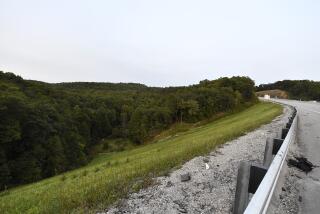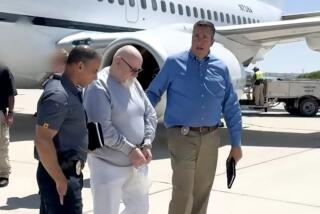A composite sketch helped lead to arrest of the Serial Street Shooter, Phoenix police say
Reporting from PHOENIX — Three thousand, five hundred calls came into the Phoenix Police Department regarding a man believed to be the Serial Street Shooter, the gunman behind the fatal drive-by shootings of nine people, a string of killings without an apparent motive that struck at the heart of this city.
But it was just one of those tips — reporting a man who looked like the police composite sketch of the suspect, driving a BMW — that led police to Aaron Juan Saucedo, 23.
After a month in custody in connection with the 2015 shooting death of his mother’s boyfriend, Saucedo was charged Monday with eight additional slayings in 2016.
Phoenix police Sgt. Jon Howard said tips related to what police called the Serial Street Shooter generally had two varieties: Urgent, and not.
The tip that led to Saucedo was one of the latter, Howard said, just another observation in the Latino-dominated neighborhoods of southern Phoenix that a person and car matched the sketch that police had begun to circulate around the city after the shootings began. The sketch showed a young man in profile, with short hair and a prominent chin.
“You never know which tip it’s going to turn out to be,” Howard said. “This one was indistinguishable from the ones before it: ‘This guy looks like the composite sketch and drives a BMW.’ Except that it led to his arrest.”
Howard would not divulge much about the results of the tip, other than to say detectives followed up a day after the call, arriving at a location where they “developed evidence” that led them to connect Saucedo to the street shootings.
Police will pay out a $75,000 reward for the information that led to Saucedo’s arrest, but Howard declined to say whether it would go to one person or multiple people.
Saucedo faces 26 felony counts of homicide, aggravated assault and drive-by shooting in connection with 12 shootings that took place between August 2015 and July 2016, Phoenix Police Chief Jeri Williams said at a news conference Monday. In addition to the nine people killed, two were injured and two more escaped injury when someone shot at their vehicle.
“We hope that our community will rest a little easier and that our officers will get a little more sleep knowing that the wheels of justice are finally in motion,” she said.
The investigation into the serial killings had focused on what authorities said were seven fatal shootings. But police on Monday said they had tied Saucedo to nine killings in all — eight random victims and one man that he knew, his mother’s boyfriend.
Two investigations unrelated to the Serial Street Shooter case led police to Saucedo, Howard said.
The first was an investigation into another serial shooter, this one from 2015 in which someone was firing projectiles at cars on Interstate 10. Some of the projectiles were believed to be bullets from a 9-millimeter handgun. No one was killed in those shootings, and the case remains unsolved.
While scouring pawn shops for a weapon connected to the highway shootings, Arizona Department of Public Safety troopers took several 9-millimeter handguns for testing.
Among them was one Saucedo had sold three weeks after the death of his mother’s boyfriend. But, notably, Public Safety did not test Saucedo’s gun. Of the eight weapons investigators collected for testing, the fourth was a match to the highway shootings. The remaining four guns, including Saucedo’s, were returned to pawn shops.
Despite the proximity of the sales of two different weapons suspected of being used in two different crimes at the same pawn shop, Public Safety said there’s no link between Saucedo and the highway shootings.
“It is common for criminals to dispose of evidence to cover up their crimes,” the department said in a news release. “These crimes were committed around similar time periods.”
Saucedo’s gun was returned to the pawn shop in September 2015, according to the Arizona Republic, and purchased by someone else in July 2016. Police retrieved the weapon and test-fired it, matching the ballistics to the shooting of his mother’s boyfriend, 61-year-old Raul Romero, in 2015.
In April of this year, police arrested Saucedo and charged him with Romero’s murder. For one month, he sat in the Maricopa County Jail on a $750,000 bond.
In the meantime, police had finished documenting every gun-related crime in Phoenix since January 2016, and assembled what they believed was a timeline of the shootings attributed to the Serial Street Shooter.
Saucedo is alleged to have killed Romero in 2015, but it wasn’t until New Year’s Day 2016 when police say Saucedo began a series of apparently random homicides, targeting people standing on their stoops or sitting in their cars.
The homicides started with a 22-year-old man. Jesse Olivas was shot multiple times and killed in front of his home. The gunfire resumed three months later.
A 16-year-old boy was shot and wounded while walking late on March 17, 2016. A 21-year-old man was shot a day later and also wounded. On April 1, Diego Verdugo-Sanchez was killed, and on April 19, Krystal Annette White was shot in front of a home and killed.
With June came the final spate of homicides. Horacio De Jesus Pena, 32, was killed on June 3, and Manuel Castro Garcia, 19, was killed on June 10. On June 12, two women and a girl were all shot while seated in a parked car. Angela Linner, 31, and Maleah Ellis, 12, died almost immediately. Stefanie Ellis, 33, died in July of her injuries.
Saucedo was arrested on April 19. One week later, Phoenix police named him a “person of interest” in the shootings until charging him Monday.
Twitter: @nigelduara
ALSO:
Suspect in killing of Boston doctors is arraigned at his hospital bed
Texas announces lawsuit against local officials considered hostile toward ‘sanctuary cities’ ban
The killing of Jordan Edwards shows again how black males — even children — are viewed as a threat
UPDATES:
5:20 p.m.: This article was updated with details about the arrest of the suspected gunman.
This article was originally published at 6:30 a.m.
More to Read
Sign up for Essential California
The most important California stories and recommendations in your inbox every morning.
You may occasionally receive promotional content from the Los Angeles Times.











